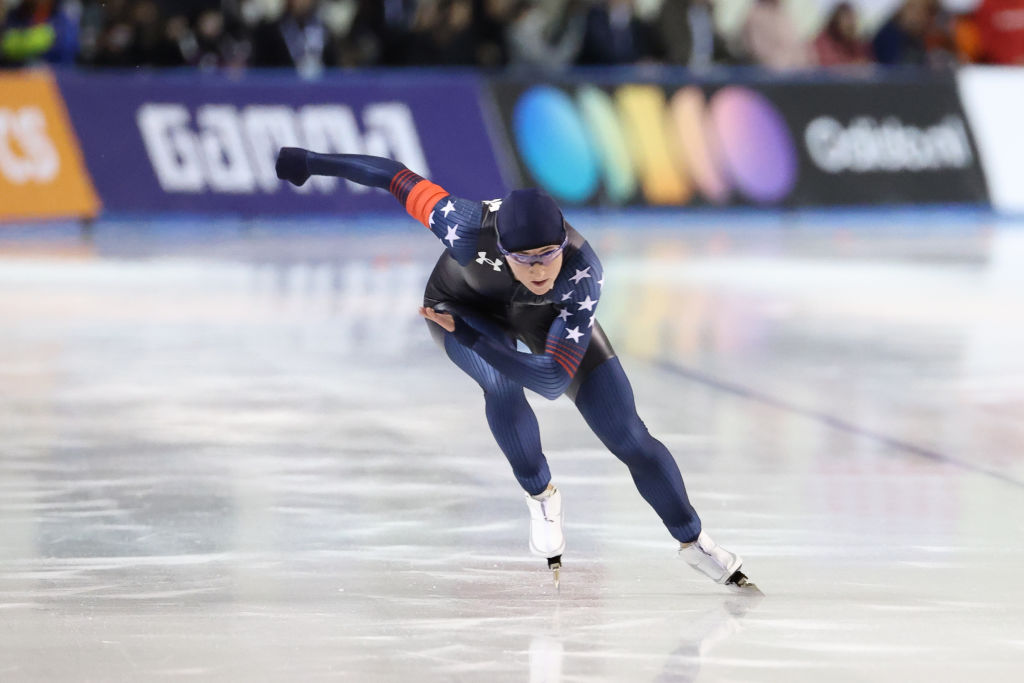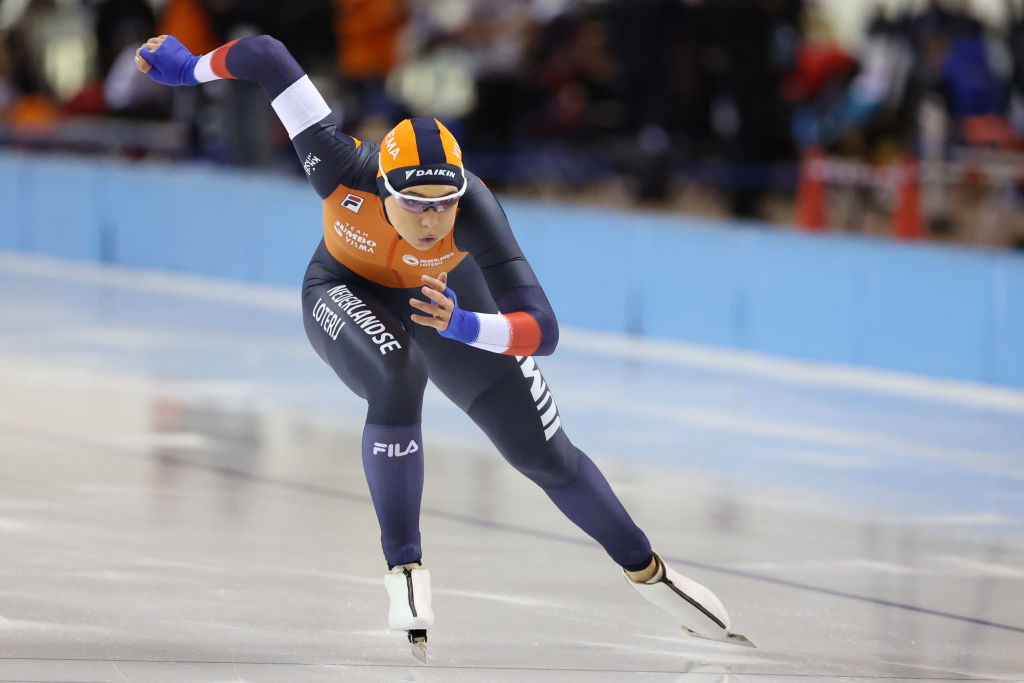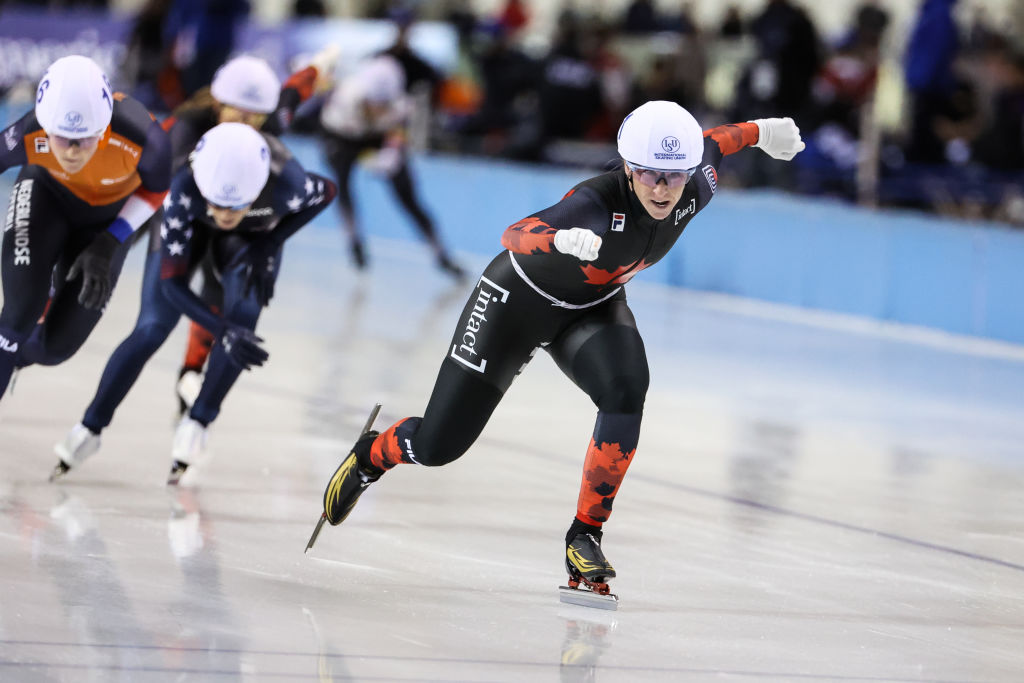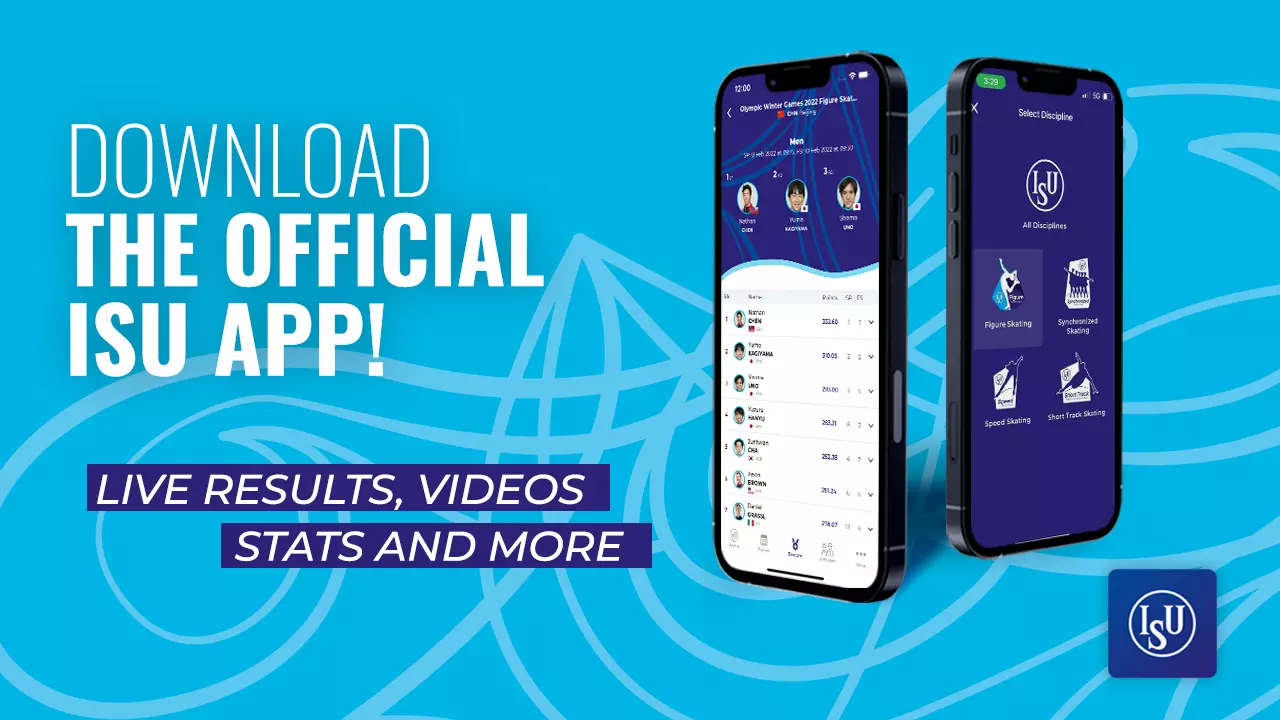Kimi Goetz (USA) had a superb start to the international season, winning gold and bronze medals at the opening day of the ISU World Cup in Obihiro (JPN) on Friday. The American seized her career first 500m World Cup gold and added a bronze in her signature 1000m just a little over an hour later. Jutta Leerdam (NED) and Miho Takagi (JPN) took gold and silver in the double sprint distance, and Ivanie Blondin (CAN) concluded Friday’s women’s competition with gold in the Mass Start.
Goetz surprises herself and the field with maiden 500m win
Skating in the last of 10 pairings, Goetz completed the 500m in 37.82s. Having arrived late due to airplane delays, the 1000m specialist surprised herself and the rest of the field when she edged out Erin Jackson (USA) by a 0.07s margin.
“The 1000m is still my main focus”, said Goetz. “But you’ve got to have some speed to be good in the 1000m and we’ve been working a lot on my 1000m opener. That’s helping with the 500m opener too.” Goetz posted 10.53s in her 500m opener.
“I’m more consistent”, she said. “This was my fifth 500m this year, and I had four 10.5 openers and one 10.4, where I usually do 10.5, 10.9, 10.7, 10.5. Hopefully I can continue this [consistency] through the season.”

Kimi Geotz put plane delays behind her to get off to a flyer in the 500m, edging out teammate Erin Jackson by just 0.07s © ISU
Before Goetz took the ice, Jackson had set the fastest time in 37.89s after also posting the fastest opener of the day in 10.43. She was surprised too, having come fresh off the back of the inline skating competition on Chilean tarmac at the Pan American Games.
“I got in here yesterday morning, so I had no idea what to expect.
“I was on inlines for about a week, had a competition last week for inline. The main thing is finding the balance point again. I’m sitting a bit more on my heels in inline, but it’s a much easier transition than last year, when I came back [on ice from inline], and I completely forgot what I was doing.”
Femke Kok (NED) was happy to start the season with a medal, taking 500m bronze in 37.93s.
“It’s so much better than my season start last year. The first 200m were actually not that good, but when I finally made pace it went well.”
Kok was especially pleased when she added a fourth place in the 1000m to her 500m bronze.“In the 1000m, I never know where I’m at. Last year I hardly skated any 1000m race, because I did not qualify for World Cups in that distance, so to get this close to the podium feels really good,” she said.
Just off the podium in the 500m was Yukino Yoshida (JPN), who finished fourth on her World Cup debut. The 20-year-old former Junior World Champion over 1000m was the only skater to set a personal best on Friday, going under 38 seconds for the first time in her career with a time of 37.96s.
Emotional autopilot win for Leerdam
After having won all five 1000m World Cup races she participated in last season, Jutta Leerdam kept to her winning ways at the season start in Obihiro. The 24-year-old 1000m world champion won her signature distance in 1 minute and 14.57s. As much as it had seemed to be business as usual, it has been an emotional roller coaster for Leerdam.

Jutta Leerdam (NED) admitted to skating on autopilot as she won 1000m gold from home favourite Miho Takagi © ISU
“It’s been a rough week. I don’t want to say too much about it, but it’s no secret either,” she said. “My mother is seriously ill, which makes it more difficult. I had panic attacks the whole week. I just wanted to win this one for her, so that she does not have to worry about me too.
“I’m happy to have won this one, but I skated this one on autopilot”, she said.
Despite racing on autopilot, Leerdam was 0.11s faster than Miho Takagi (JPN), who took silver on home ice.
“My skating is not good enough to level with [Leerdam]”, the Obihiro-born Olympic champion said. “My shape is good, but I’m skating on new blades this year and I have to adjust. That’s work in progress.”
Takagi was proud to skate in front of a home crowd, but she did not want to jump to conclusions after her first World Cup race.
“I know a lot of people in the audience and from the venue staff, that gave me so much power today. But this is the first international competition for many skaters. Usually the first World Cup doesn’t tell you a lot [about the rest of the season].”
Goetz surely hopes to prove Takagi wrong. After seizing her second medal of the day in third place with 1:14.75, she said: “It’s an exciting start. I’m closer to Jutta [Leerdam] than I normally am. Last year I had a kind of a slow start to the season. So hopefully, if I start on a higher note, I can maintain that, but we’ll see how it goes.”
Teamwork pays off for Blondin in mass start
Ivanie Blondin won the women’s mass start in a bunch sprint after team mate Valérie Maltais (CAN) reeled in Laura Lorenzato (ITA), who had escaped from the pack after the last intermediate sprint.
“I think Val [Maltais] and I, we covered our ducks throughout the entire race”, Blondin said. “It was good, but it would even have been better if we were one and three or one and two.”
Maltais eventually finished fourth behind Esther Kiel (NED) and Mia Kilburg (USA).

Ivanie Blondin (CAN) won a sprint in a mass start which saw Netherlands' Esther Kiel take a surprise silver © ISU
For Kiel the Obihiro mass start was an unexpected opportunity. Marijke Groenewoud and Irene Schouten (NED) are the usual suspects in the Dutch line-up, but the world champion and the Olympic champion decided to skip the first World Cup in Japan, leaving the floor to Kiel and Reina Anema (NED). The substitutes made the best of it and Kiel cherished her medal.
“It’s the first and it might also be the last this season, because normally we don’t race [the mass start],” said Kiel. “It’s a pity, but I do understand it too.
“The race went well. Reina kept the pace high so no one could really escape and I managed to position well behind Blondin, because I knew she the fastest sprinter. I hope to have shown what I can do in the mass start and whenever Irene or Marijke is absent, I’ll be up for it. For the rest of the season I’ll focus on the 1500m in the World Cups and the 5000m in Stavanger.”
For all information about the ISU World Cup Speed Skating Series, please visit the webpage here.
All Media Accreditations details and deadlines for the ISU World Cup Short Track Speed Skating Series can be found here.
Where to watch
Viewers will be able to watch the World Cup sessions via their national broadcaster/channel.
For countries where there are no broadcasters, the ISU will offer a live stream with English commentary on the Skating ISU YouTube Channel. You will find the full list on the Where to watch webpage here.
Subscribe to the ISU YouTube Channel to receive all the latest videos and follow the conversation with #SpeedSkating.
ISU World Cup Short Track Speed Skating Series events 2023/24:
Nov 10 - 12, 2023 Obihiro /JPN
Nov 17 - 19, 2023 Beijing /CHN
Dec 01 - 03, 2023 Stavanger /NOR
Dec 08 - 10, 2023 Tomaszów Mazowiecki /POL
Jan 26 - 28, 2024 Salt Lake City /USA
Feb 02 - 04, 2024 Québec /CAN
About ISU World Cup Speed Skating Series
The ISU World Cup Speed Skating is a Series of Speed Skating competitions which have taken place annually since 1984. The series comprises six events (four during an Olympic season), with A Division and B Division races. Skaters can earn points at each competition, and the Skater with the most points on a given distance at the end of the series is the World Cup winner in that distance. The four World Cup Competitions held from November to December serve as qualifying events for entry quotas at the ISU European Championships, and the ISU Four Continents Championships. The whole series of six events serves as qualifying events for the World Single Distances Championships, and/or the World Sprint and Allround Speed Skating Championships.
World Cup titles are awarded in 500m, 1000m, 1500m, combined 5000m/10,000m, and Mass Start for men, and 500m, 1000m, 1500m, the combined 3000m/5000m, and Mass Start for women. Both genders also compete for the World Cup titles in Team Pursuit and Team Sprint. New in the 2023/24 program is the Mixed Gender Relay over six laps, in which teams of one man and one woman compete.
(For full explanation of this season’s ISU World Cup (entry rules, formats, qualifying, and prizes: https://www.isu.org/speed-skating/rules/ssk-communications/31562-isu-communication-2587/file)

